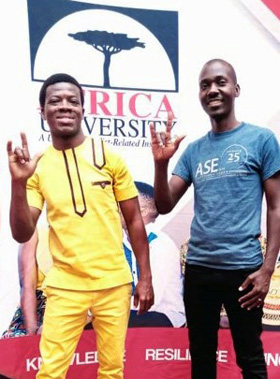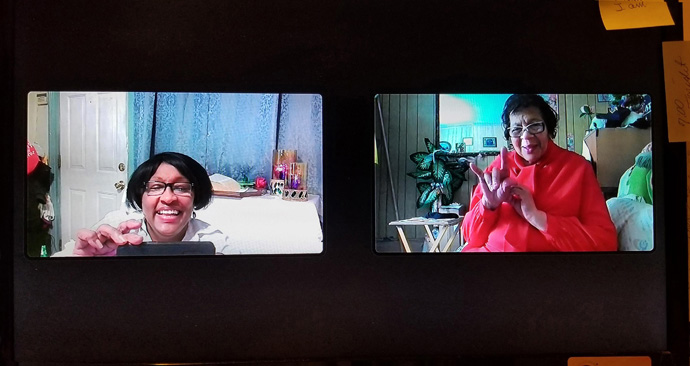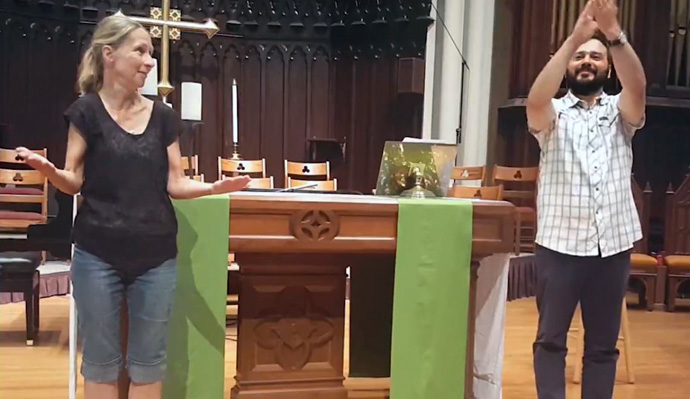Before the COVID-19 pandemic, the array of worship services offered by Lovers Lane United Methodist Church included one in American Sign Language. About two dozen people came on a typical Sunday.
On March 22, when the Dallas church could no longer safely meet in person due to the fast-spreading coronavirus, the sign language service debuted online.
It came together quickly, and a bit primitively. For want of a tripod, a cell phone with a video camera was propped up by hymnals on an upright piano.
But word had gotten around, and about 200 Deaf and hard of hearing people tuned in.
“I was just stunned,” said the Rev. Tom Hudspeth, pastor of Deaf ministries at the church.

Since then, professionalism has increased and viewership for livestream and archived broadcasts has grown to about 450 weekly.
People from around Texas and the rest of the U.S. have joined the virtual flock. Others have made it known they’re watching from Greece, Zambia, Sri Lanka, the Bahamas, Australia.
Collins Prempeh, a Deaf student of theology at The United Methodist Church’s Africa University, has participated from Zimbabwe.
“We’ve circled the globe on this,” Hudspeth said.
The COVID-19 pandemic has meant all kinds of upheaval for The United Methodist Church and other religious groups. For Deaf ministries, it’s been a season of challenges and opportunities.
Those will be discussed Aug. 8 at a United Methodist Congress of the Deaf Northeastern Jurisdiction Deaf Ministry Virtual Summit, a free event open to all, but with registration required. Eastern Pennsylvania Conference Bishop Peggy Johnson — who has a long history in Deaf ministries, and signs fluently — will be among the speakers.
As Johnson points out, much of The United Methodist Church has of necessity gone online with worship for the first time or enhanced online offerings since the pandemic began – with better access for Deaf and hard of hearing folks as a consequence.
“I am thrilled at how many online opportunities are now available throughout the country,” the bishop said.
At the United Methodist Church of the Resurrection — the denomination’s best-attended church — one worship service is now aired on TV, an effort to reach people who don’t have or aren’t comfortable using the internet. That service of the Leawood, Kansas, church is closed captioned, a boon to people who can’t hear or hear poorly.
Grove United Methodist Church in West Chester, Pennsylvania, was getting ready to debut online worship when the pandemic hit in March. The church quickly went online, and Deb Knerr, wife of the pastor, the Rev. Gary Knerr, decided she would do American Sign Language interpretation.
Deaf ministries resources
The United Methodist Congress of the Deaf promotes Christian discipleship and leadership within the Deaf community.
The United Methodist Committee on Deaf and Hard of Hearing Ministries, part of the United Methodist Board of Global Ministries, provides resources to local churches and conferences.
That committee keeps a list of churches offering worship services (including livestreamed and archived services) that offer American Sign language, captioning or similar accommodations.
“I felt there was a population out there that might not be being served and decided to use the skills that I have and the gifts that God gave me to reach some of that population,” said Knerr, a professional sign language interpreter.
Knerr watches the recorded services and signs the sermon, Scripture reading and children’s message in a separate video posted on Youtube. She’s heard appreciatively from a range of watchers, including from other denominations.
At Emmanuel United Methodist Church in Laurel, Maryland, the Rev. Leo Yates Jr. has been doing sign language interpretation for the livestream services since the pandemic began.
“I was interpreting twice a month during our in-person services, but we had a conversation about the need to provide communication access during this challenging time,” said Yates, who recently blogged about Deaf ministries and COVID-19.
He added that the audience has included professors at nearby Gallaudet University, a federally chartered private school for the Deaf and hard of hearing.
Along with livestreaming its sign language service on Sunday, Lovers Lane United Methodist has added a Wednesday night Zoom gathering for the Deaf and hard of hearing. Hudspeth, born hard of hearing, officiates in sign language.
On Aug. 5, about 15 people from Dallas and beyond joined in, sharing concerns about COVID-19, especially as schools get ready to resume. Some mentioned the depression they’ve battled as the pandemic has kept them quarantined.
“They’re isolated,” said Mary Kay Hudspeth, wife of the pastor and a Deaf participant in the call. “It helps them to have this connection once a week.”
When Deaf or hard of hearing people do go out, say to the grocery store, they can face new frustration in trying to understand masked employees.
“Wearing a mask hinders communication for people who need lip reading,” said Esther Choi, a Deaf member of Lovers Lane United Methodist.

Rosalind “Roz” McKelvey leads the Deaf outreach program at Grace United Methodist Church in Philadelphia. She’s been distributing masks that have a clear plastic panel over the mouth to essential workers. The panel allows lip reading.
McKelvey has been busy on other fronts, checking in on Deaf church members, interpreting sermons preached during online worship and passing out COVID-19 information cards to Deaf and hard of hearing people, especially those struggling economically and in other ways.
“The Deaf have to understand that germs they can’t see can kill them,” McKelvey said.
McKelvey’s work with low-income people who also have hearing loss and other challenges has made her a hero to Johnson, especially during the pandemic.
“Roz’s heart is right there in the margins,” the bishop said.

As churches try to reopen safely for in-person worship, they will have to enforce physical distancing. That means no hugs and handshakes during passing the peace.
Deaf people and allies see an opportunity.
“We have started to have churches use the Deaf sign language sign for `I love you,’” said Carol Stevens, a certified lay minister and American Sign Language interpreter at Grace United Methodist Church in Wilmington, Delaware. “It is easy to learn and good both virtually and when we get back to worshipping together.”
Stevens, fellow lay minister Karen Miller and the Rev. Edwin Esteves, pastor of Grace United Methodist, collaborated in a short video that teaches sign language for “Peace be with you” and “I love you.”
Miller, who is deaf, said by email that she’s hopeful the video will help churches and raise awareness among hearing folks of the richness of Deaf culture.
“We are also God’s children,” she said.
Hodges is a Dallas-based writer for United Methodist News. Eveline Chikwanah contributed from Zimbabwe. Contact Hodges at 615-742-5470 or [email protected]. To read more United Methodist news, subscribe to the free Daily or Weekly Digests.
Like what you're reading? Support the ministry of UM News! Your support ensures the latest denominational news, dynamic stories and informative articles will continue to connect our global community. Make a tax-deductible donation at ResourceUMC.org/GiveUMCom.

